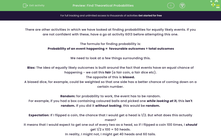There are other activities in which we have looked at finding probabilities for equally likely events. If you are not confident with these, have a go at activity 6013 before attempting this one.
The formula for finding probability is:
Probability of an event happening = favourable outcomes ÷ total outcomes
We need to look at a few things surrounding this.
Bias: The idea of equally likely outcomes is built around the fact that events have an equal chance of happening - we call this fair (a fair coin, a fair dice etc).
The opposite of this is biased.
A biased dice, for example, could be weighted so that one side has a better chance of coming down on a certain number.
Random: for probability to work, the event has to be random.
For example, if you had a box containing coloured balls and picked one while looking at it, this isn't random. If you did it without looking, this would be random.
Expectation: If I flipped a coin, the chance that I would get a head is 1/2. But what does this actually mean?
It means that I would expect to get one out of every two as a head, so if I flipped a coin 100 times, I should get 1/2 x 100 = 50 heads.
In reality, I might not, I might get 40 heads and 60 tails.
We will discuss this further in the activity on experimental probability.
Let's move on to some questions now.








